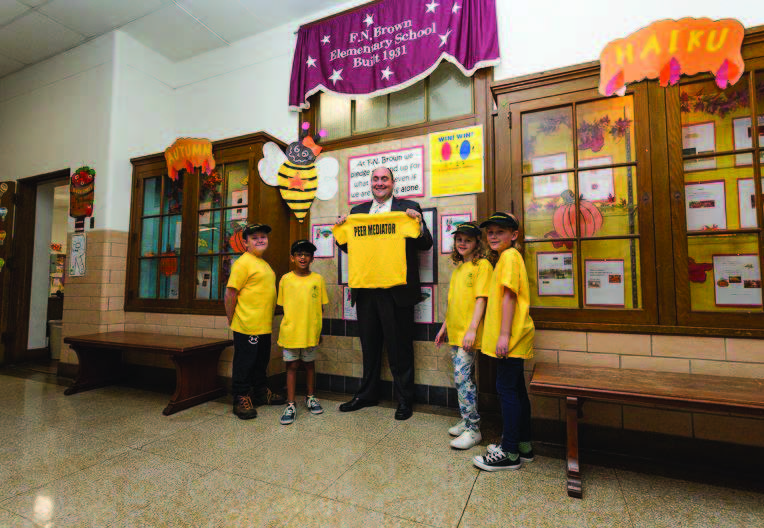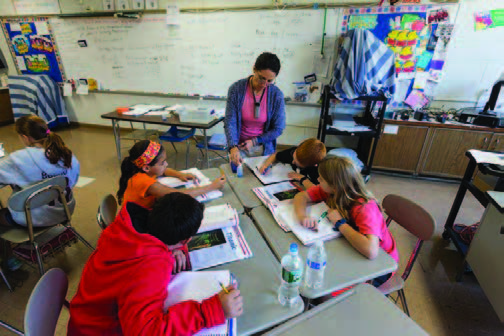Teaching Important Life Skills to Our Children… Resolving Conflict & Seeking Solutions through Mediation
by Dr. Anthony Lanzo, F.N. Brown Principal
Conflict is inevitable in life and our schools can play an integral role in teaching our children important life skills to enable them to successfully navigate resolving problems. It is our responsibility to teach students to be peacemakers and learn how to handle conflict when it arises. Elementary students in Verona are taught the Conflict Resolution approach to assist with problem solving any type of controversy or disagreement. Using the New Jersey State Bar Foundation (NJSBF) materials as a starting point, students apply the Win-Win Guidelines when they face any type of opposition. Conflict resolution lessons are taught on a weekly basis in each elementary classroom. Classroom teachers introduce the skill through mini-lessons, modeling, guided practice, independent practice, role-playing, and/or children’s literature. Lessons are easily adapted to the students’ learning abilities throughout the K-4 experience. Students are taught that there are various forms of conflict and the necessary tools needed to resolve them. They are also taught how to solve a problem. In order to reach resolution, we work with students to improve their communication skills. We believe that effective communication between the disputants is critical with solving any type of struggle between or among people. Home-school connections are assigned throughout the school year. Home-school connections require students to review and apply various conflict resolution skills at home. It also serves as a means of communicating with families our current district focus. It is also an opportunity to discuss the principles connected to the concept or skill. Parents and students are encouraged to collaborate while completing the home-school connection. This encourages families to have conversations surrounding the particular concept or skill as they examine various scenarios together.
We begin each school year by connecting the concept of ‘Peace’ and how it starts with each student. We also stress the commitment each one of us must possess to work any type of problem out. Each classroom including specialists, related services and special education have set up a Peace Place where students can meet to discuss a conflict. The Win-Win Guidelines help our students deal with conflicts in such a way that all disputants feel comfortable with the outcome. Guidelines focus on taking time to cool off and finding alternative ways to express anger, stating a feeling using an “I Message”, stating the problem as the other person sees it, taking responsibility for the problem, brainstorming solutions that satisfy both parties, and concluding with an affirmation. The Win-Win Guidelines are displayed for students’ reference. Various tools such as cooling off techniques, breathing for calmness tips, alternatives to hitting, I-Message scripts and feelings vocabulary are available to all students as resources.
Conflict resolution assemblies are held through-out the school year where students observe, analyze and/or participate in skits where they can apply and fine tune their resolution skills. Students are also trained on distinguishing between conflict and bullying. Skits demonstrating conflict and bullying are also reviewed, evaluated and discussed at school wide assemblies. Student and staff enthusiasm and participation are at a high level during assemblies.
Each elementary school offers a peer mediation program. Research has proven that peer mediation is an effective tool that can be used by elementary students to help resolve conflicts. It empowers students to resolve their disputes creatively and cooperatively, while infusing critical thinking skills. Students in grades 3 and 4 may apply to be a trained peer mediator. Peer mediators are required to attend training sessions prior to taking their post. Prospective peer mediators practice mediation skills with the desired outcome focused on facilitating a problem solving approach while working with disputants that require a third party to help them reach resolution. They are also required to attend follow up meetings in order to maintain an active status. Peer mediators and parents sign a code of conduct outlining the expectations.
 Elementary students have the option to mediate a problem using the school wide peer mediation process. It is voluntary to work with a peer mediator. The peer mediator serves as a “third party” that assists the disputants with problem solving. Brainstorming as many possible solutions to a problem is key to the peer mediation process. Our peer mediators work in pairs to assist the disputants discuss and solve their problem with the goal of reaching a solution that works for both parties. Peer mediators reference the Win-Win Guidelines while working with disputants. Peer mediators encourage disputants to retell the problem from their individual perspective and express their feelings. The role of the peer mediator is one of a facilitator encouraging disputants to discuss the problem in a non-judgmental manner while applying active listening skills.
Elementary students have the option to mediate a problem using the school wide peer mediation process. It is voluntary to work with a peer mediator. The peer mediator serves as a “third party” that assists the disputants with problem solving. Brainstorming as many possible solutions to a problem is key to the peer mediation process. Our peer mediators work in pairs to assist the disputants discuss and solve their problem with the goal of reaching a solution that works for both parties. Peer mediators reference the Win-Win Guidelines while working with disputants. Peer mediators encourage disputants to retell the problem from their individual perspective and express their feelings. The role of the peer mediator is one of a facilitator encouraging disputants to discuss the problem in a non-judgmental manner while applying active listening skills.
Peer Mediators have the ability to fulfill their role and act without guidance while working with disputants. The student body understands the role of the peer mediator and values the peer mediation process. Students that are unable to solve a problem on their own are encouraged to ask the mediators for assistance. Students understand their role and the mediator’s role in the mediation process. Students know how to locate a mediator when they need help resolving a conflict. Disputants should feel satisfied at the conclusion of the mediation process. Once the first two steps are accomplished then mediating using the Win-Win Guidelines can commence. The peer mediation process is always confidential.
Conflict resolution and peer mediation have proven to reduce disputes. Verona elementary students are taught a specific skill set when approaching a disagreement. It also fosters a culture where students develop and apply real life skills that evolve throughout their development. Students recognize that a course of action is possible to solve a conflict. Compromise is common among Verona students as the mediation process promotes students making concessions to settle differences. Conflict resolution and peer mediation fosters cooperation where students work together for a common purpose. This approach supports our district mission of empowering students to achieve their potential as active learners and productive citizens. We take pride in training our students to be peacemakers in our beloved Verona community.
Click here to read more articles in the Verona Public Schools Magazine 2016-2017 Edition.



